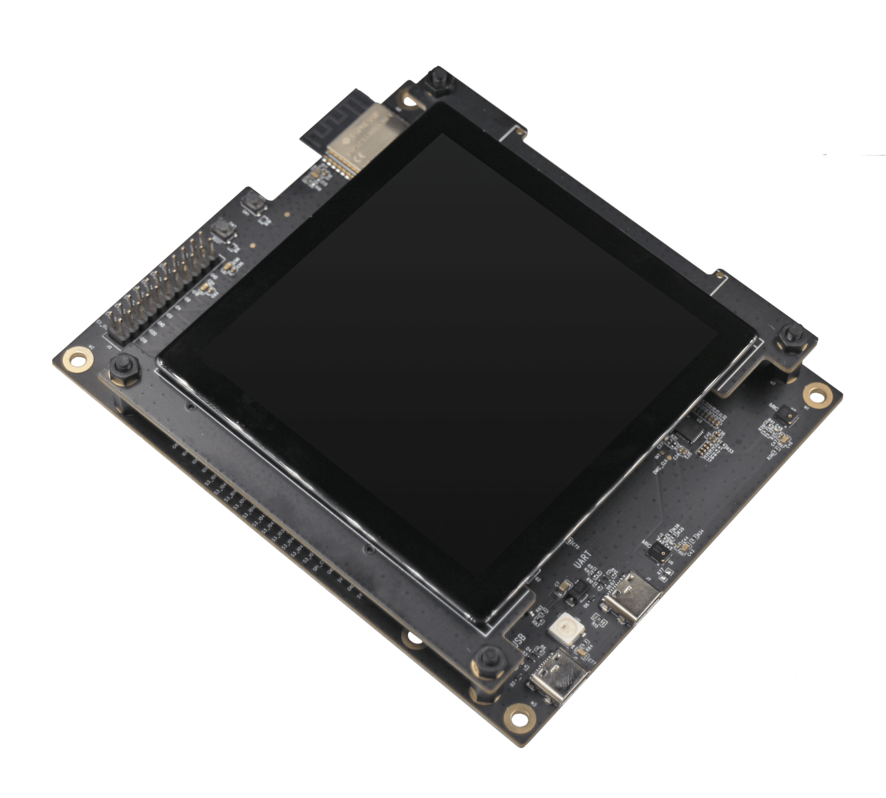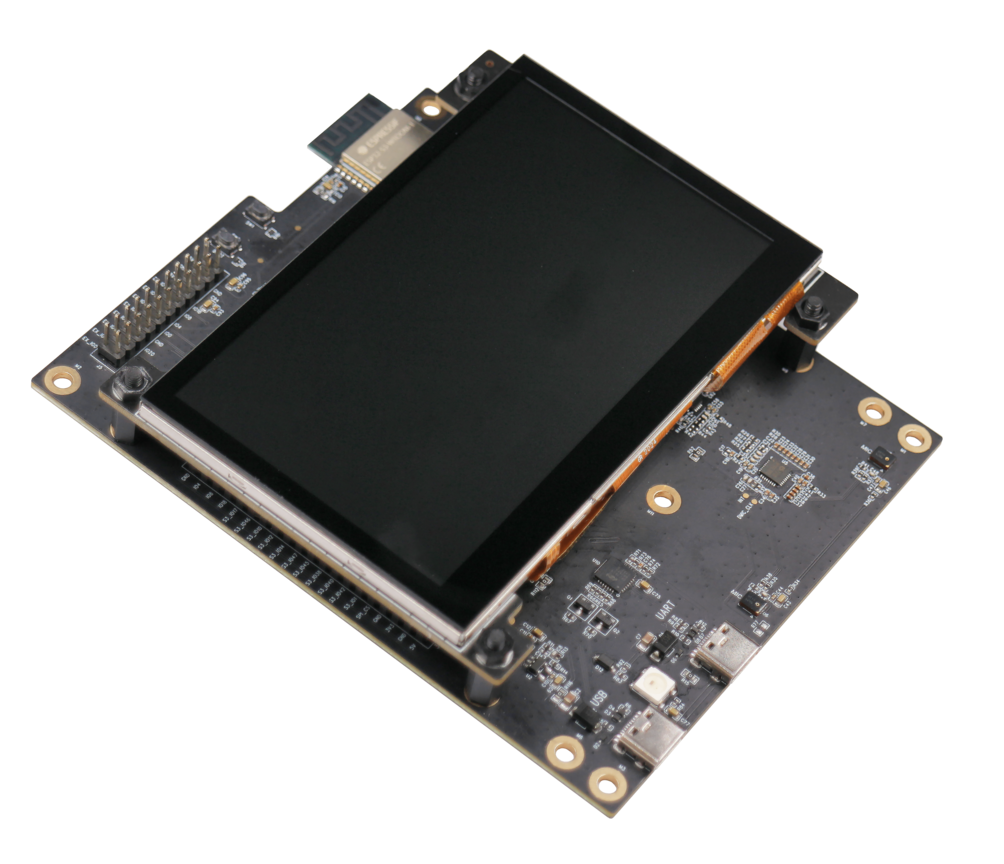ESP32-S3-LCD-EV-Board is a development board for evaluating and verifying ESP32-S3 screen interactive applications. It has the functions of touch screen interaction and voice interaction. The development board has the following characteristics:
- Onboard ESP32-S3-WROOM-1 module, with built-in 16 MB Flash + 8/16 MB PSRAM
- Onboard audio codec + audio amplifier
- Onboard dual microphone pickup
- USB type-C interface download and debugging
- It can be used with different screen sub boards, and supports
RGB,8080,SPI,I2Cinterface screens, as below:
| Board Name | Screen Size (inch) | Resolution | LCD Driver IC (Interface) | Touch Driver IC | Schematic | Support |
|---|---|---|---|---|---|---|
| ESP32-S3-LCD-EV-Board-SUB1 | 0.9 | 128 x 64 | SSD1315 (I2C) | * | link | Not yet |
| 2.4 | 320 x 240 | ST7789V (SPI) | XTP2046 | Not yet | ||
| ESP32-S3-LCD-EV-Board-SUB2 | 3.5 | 480 x 320 | ST7796S (8080) | GT911 | link | Not yet |
| 3.95 | 480 x 480 | GC9503CV (RGB) | FT5x06 | Yes | ||
| ESP32-S3-LCD-EV-Board-SUB3 | 4.3 | 800 x 480 | ST7262E43 (RGB) | GT1151 | link | Yes |
Here are some useful configurations in menuconfig that can be customed by user:
BSP_LCD_RGB_BUFFER_NUMS: Configure the number of frame buffers. The anti-tearing function can be activated only when set to a value greater than one.BSP_LCD_RGB_REFRESH_MODE: Choose the refresh mode for the RGB LCD.BSP_LCD_RGB_REFRESH_AUTO: Use the most common method to refresh the LCD.BSP_LCD_RGB_BOUNCE_BUFFER_MODE: Enabling bounce buffer mode can lead to a higher PCLK frequency at the expense of increased CPU consumption. This mode is particularly useful when dealing with screen drift, especially in scenarios involving Wi-Fi usage or writing to Flash memory. This feature should be used in conjunction withESP32S3_DATA_CACHE_LINE_64Bconfiguration. For more detailed information, refer to the documentation.
BSP_DISPLAY_LVGL_BUF_CAPS: Select the memory type for the LVGL buffer. Internal memory offers better performance.BSP_DISPLAY_LVGL_BUF_HEIGHT: Set the height of the LVGL buffer, with its width aligning with the LCD's width. The default value is 100, decreasing it can lower memory consumption.BSP_DISPLAY_LVGL_AVOID_TEAR: Avoid tearing effect by using multiple buffers. This requires settingBSP_LCD_RGB_BUFFER_NUMSto a value greater than 1.BSP_DISPLAY_LVGL_MODE:BSP_DISPLAY_LVGL_FULL_REFRESH: Use LVGL full-refresh mode. SetBSP_LCD_RGB_BUFFER_NUMSto3will get higher FPS`.BSP_DISPLAY_LVGL_DIRECT_MODE: Use LVGL's direct mode.
Based on the above configurations, there are three different anti-tearing modes can be used:
- RGB double-buffer + LVGL full-refresh mode:
- Set
BSP_LCD_RGB_BUFFER_NUMSto2 - Enable
BSP_DISPLAY_LVGL_AVOID_TEARandBSP_DISPLAY_LVGL_FULL_REFRESH
- Set
- RGB double-buffer + LVGL direct-mode:
- Set
BSP_LCD_RGB_BUFFER_NUMSto2 - Enable
BSP_DISPLAY_LVGL_AVOID_TEARandBSP_DISPLAY_LVGL_DIRECT_MODE
- Set
- RGB triple-buffer + LVGL full-refresh mode:
- Set
BSP_LCD_RGB_BUFFER_NUMSto3 - Enable
BSP_DISPLAY_LVGL_AVOID_TEARandBSP_DISPLAY_LVGL_FULL_REFRESH
- Set
| Capability | Available | Component | Version |
|---|---|---|---|
| DISPLAY | ✔️ | espressif/esp_lcd_gc9503 | ^3 |
| LVGL_PORT | ✔️ | espressif/esp_lvgl_port | ^2 |
| TOUCH | ✔️ | espressif/esp_lcd_touch_ft5x06 | ^1 |
| BUTTONS | ✔️ | espressif/button | >=2.5,<4.0 |
| AUDIO | ✔️ | espressif/esp_codec_dev | ^1,<1.2 |
| AUDIO_SPEAKER | ✔️ | ||
| AUDIO_MIC | ✔️ | ||
| SDCARD | ❌ | ||
| IMU | ❌ |

